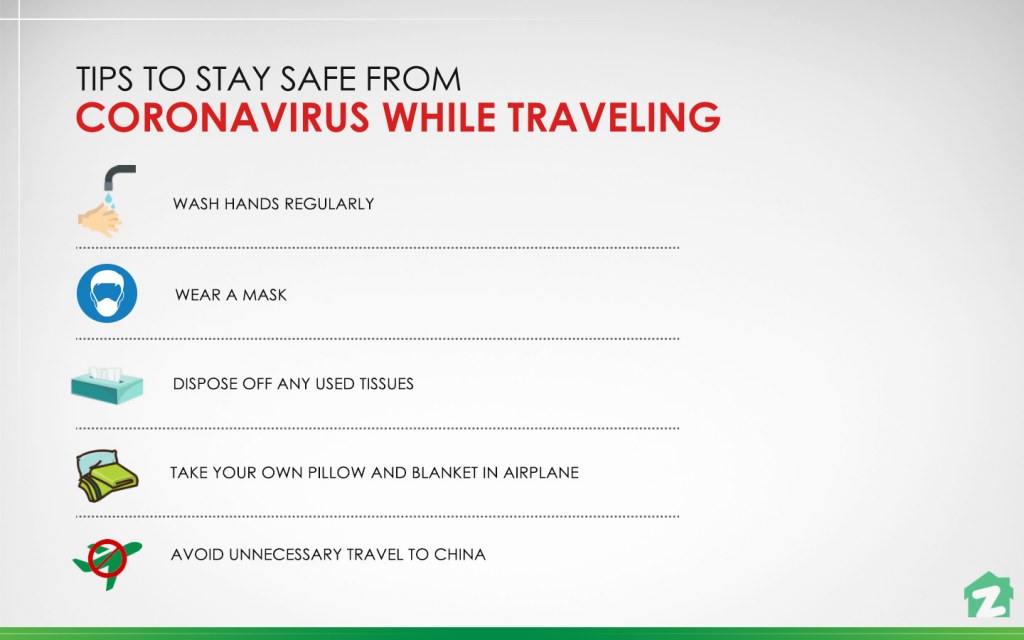In This Post:
– Latest Updates on Coronavirus in Pakistan
– Coronavirus Test in Pakistan
– What is Coronavirus?
– Symptoms of Coronavirus
– Who is Prone to the Virus
– How to Avoid Spread of Coronavirus
– Prevention Tips
– Corona Isolation Techniques
– Which Countries are Affected the Most
– Travel Advice to China
– Tips to Travel Safe
– Safety Measures at Airports
Latest Updates on Coronavirus in Pakistan

Update (Apr 17, 2020): The number of coronavirus cases in Pakistan has increased to 7,027. The province-wise breakup of coronavirus cases in Pakistan are as follows: 3,276 in Punjab, 2,008 in Sindh, 993 in KP, 305 in Balochistan, 245 in Gilgit-Baltistan, 154 in Islamabad and 46 in Azad Kashmir. 135 deaths have been reported in the country.
Update (Mar 16, 2020): The total number of coronavirus cases in Pakistan has jumped to 106, while in Sindh the number of confirmed cases now stands at 89. In efforts to contain the coronavirus disease from spreading, Chief Minister Sindh Murad Ali Shah ordered the closure of marriage halls, cinemas, shrines, clubs and urs gatherings. He also imposed a ban on intercity traveling of government officers as an added precautionary measure to curtail the spread of the disease.
Update (Mar 13, 2020): Schools, colleges and universities in Sindh to remain closed till May 30. Moreover, PSL matches in Karachi will be played in an empty stadium without spectators as a precautionary measure to avoid the spread of coronavirus in the city.
Update (Mar 12, 2020): The World Health Organisation (WHO) has declared the coronavirus outbreak as a pandemic. WHO has called for ‘aggressive and urgent action’ as the virus has spread to 114 countries. In Pakistan, the number of cases now stands at 20.
The Sindh Health Department has issued an advisory for educational institutions in Sindh, stating that any student or employee who has returned to Pakistan in the past 15 days or has a family member who has arrived from abroad should complete a 14-day quarantine period before coming to schools, colleges, and universities. Parents have also been advised to inform the management if a family member has recently come to Pakistan.
Moreover, Saudi Arabia has cancelled all flights coming to and from Pakistan until further notice except for medical practitioners. The Saudi government has given 72 hours time to iqama holders to return to Saudi Arabia.
Update (Mar 10, 2020): Two more coronavirus cases have emerged in Sindh. One case is from Hyderabad; the patient had just come back from Syria via Doha, Qatar. The second case has been reported in Karachi; the patient had traveled from Iran via Dubai, UAE. The total number of cases in Karachi alone has now risen to 15, which is by far the most affected city in Pakistan. According to Sindh’s Secretary Education Khalid Shah, schools in Sindh will reopen from March 16, 2020, and there will be no extension for school holidays.
Update (Mar 10, 2020): Nine new cases of coronavirus have been confirmed in Karachi. The patients who tested positive for COVID-19 had come from England and Syria. They are now being treated in different hospitals across Sindh. The total number of infected cases in Sindh is now 13 and the total number of coronavirus cases in Pakistan now stands at 16.
Among the nine new coronavirus cases, six patients had traveled to Syria and returned to Pakistan via Doha, Qatar, whereas the other three patients had been to London and returned to Pakistan via Dubai, UAE, during the last week.
Update (Mar 9, 2020): The seventh coronavirus case in Pakistan has been confirmed by the Health Minister Dr Zafar Mirza, making the number of cases in Karachi rise to four. The patient is a 50-year old resident of Karachi. His family and other contacts have been quarantined. The government is also investigating the patient’s travel history.
Update (Mar 6, 2020): A sixth case has been confirmed in Pakistan, taking the number of coronavirus cases in Karachi to three. A 69-year old man who recently returned from Iran has been tested positive. He “is in clinically stable condition in Sindh and is being well taken care of,” according to Special Assistant to the Prime Minister on Health Dr. Zafar Mirza.
Chief Minister Sindh Murad Ali Shah issued directives to quarantine the family and screen those who came in contact with the infected person.
Update (Mar 3, 2020): The fifth case of coronavirus has surfaced in Pakistan. The patient shares the same travel history as of other patients previously reported.
It is reported that the patient is a 45-year old woman, belonging to Gilgit-Baltistan, who recently traveled from Iran. She is being treated at a hospital and her family members and those with whom she has traveled are being tested for coronavirus. Among the previous coronavirus infected cases, two belonged to Karachi and one each from Islamabad and the Federal Areas.
The Gilgit-Baltistan government announced the closure of schools till March 7 as coronavirus cases emerged in Gilgit. This is taken as a precautionary measure to control the spread of the deadly virus. Meanwhile, all educational institutes in Sindh remain closed till March 13, 2020. The Sindh Government suspended the registration of 50 schools that remained open despite the provincial government’s orders.
All business and trade activities at the Chaman border remain suspended. Offices of transport, customs, immigration and other establishments remain closed. The Friendship Gate at the Afghan-Pakistan border is also closed. Many Afghan patients and people who did not know about the border being closed wanted to cross the border and get treatment in Pakistani hospitals. However, they were denied entry into the country. The Afghan-Pakistan border will remain closed till March 9.
Update (Mar 2, 2020): More than 2,900 people have died and over 85,000 have been infected with coronavirus globally. Two new cases of COVID-19 emerge in Pakistan, making the tally rise to 4 cases of coronavirus in the country. To control the spread of disease, Sindh government has announced the closure of schools, colleges and universities until March 13, 2020.
Dr Zafar Mirza, PM’s Special Assistant on National Health Services informed the public that Pakistan was the last country in the region and the 48th country in the world to have acquired the disease among 57 countries currently suffering from coronavirus. So, there was ‘no need to panic.’ He also said that a comprehensive plan has been developed about protective measures and protocols that will be adopted once the pilgrims come back from Iran.
To help raise awareness among the people regarding coronavirus in Pakistan, National Health Services has launched an online web portal for the awareness of coronavirus in Pakistan.

The portal comprises details about the symptoms of COVID-19, its spread in humans, incubation period, insulation and quarantine methods, protective and preventive measures, as well as travel tips and advisories, among other important information.
To ensure that no coronavirus patients enter Pakistan, automatic thermal scanners have been placed at major airports in the country. These thermal scanners are equipped to immediately detect higher-than-normal-body-temperatures of passengers at security checkpoints. This has been introduced as part of the screening mechanism at all entry points.
In order to improve the capabilities, latest thermal scanners have been installed at Islamabad International Airport for detecting suspected NCoV passengers arriving via international flights. The machine will turn ON a buzzer as soon as it detects a passenger having temperature. pic.twitter.com/K2hnSuCcFs
— Aviation Division PK (@AviDivPK) March 1, 2020
Update (Feb 27, 2020): Coronavirus reaches Pakistan!
Two cases of COVID-19 or novel Coronavirus in Pakistan have been reported. Both patients recently came back from Iran. The patients have been quarantined. Due to the emerging situation, all academic institutions in Sindh and Balochistan have been closed. In Sindh, schools would be closed on February 27 and 28, while in Balochistan the schools have been shut down till March 15. Further directives will be issued after examining the situation.
- The coronavirus outbreak has spread across 40 countries, killing around 2,700 people
- At least 80,000 people have been diagnosed with the illness across the globe
- Iran is the worst-hit country after China
- At least 19 Iranians have died out of a total of 139 positive cases
- Three isolation wards have been set up to deal with the health crisis in Karachi. One is at Civil Hospital, the other at Jinnah Postgraduate Medical Centre (JPMC) and the third one is in AKUH (Aga Khan University Hospital)
- Helpline 1166 has been established for public safety from coronavirus in Pakistan
Coronavirus Test in Pakistan
Three hospitals in Pakistan are currently conducting tests for coronavirus: Aga Khan University Hospital in Karachi, Shaukat Khanum Hospital in Lahore and National Institute of Health in Islamabad.
The process of coronavirus test in Pakistan is quite simple. Here’s how it works:
- The coronavirus test sample is taken through the nasopharyngeal i.e. the nose and throat swab test
- The sample is then dipped in a liquid medium
- Your sample is transported to any of the above hospitals
- It then reaches the lab, where it is made sure that the results are not cross-contaminated with other samples
- The virus is extracted and transported to a machine, where it is tested for either positive or negative results
- The test is then faxed to the hospital
- Results are given within 8 hours
Extra Precautionary Measures to Stay Safe From Coronavirus in Pakistan
To stay safe from coronavirus in Pakistan, it is important to take added preventive measures.
- Wash your hands thoroughly for 30 seconds. Wash the back of your hands, the palm area and under the nails.
- Wear a protective mask, but if a person in front of you is coughing and sneezing, the outer surface of your mask might carry the infection. If you have a surgical mask make sure to discard it after using it for a day.
- If you see someone sneezing and coughing, maintain a distance of 2 metres to avoid large droplets
- If an infected person sneezes and coughs and touches any object, he can transfer the virus onto the object such as pen, mouse, laptop, doorknobs etc.
- Remember, viruses can last for 48 hours on objects and the only effective way of getting rid of the virus is to wash them with soap and hot water. You can also keep a clean towel with you and wear protective gloves whenever touching objects as a safety measure.
- Keep a separate glass, cup, food utensils, towel and other items of each member of the family – especially if you spot signs of influenza
- Build your immunity system. Drink lots of fresh juices and take care of your health. Make sure you take proper sleep.
Update (Feb 24, 2020): At least 8 people have been killed in Iran and 43 cases have been reported of the deadly coronavirus disease. Pakistan has closed its borders with Iran amidst fear of the coronavirus outbreak in Pakistan. Armenia and Turkey also suspend incoming flights to stop the spread of the deadly disease. Most of the deaths have occurred in the city of Qom, which is one of the most-visited religious destinations in Iran. The health minister of Iran has advised no travel to and from the city of Qom to curtail the spread of disease.
Apart from Iran, Italy and South Korea have also reported coronavirus infected cases. At least 10 people have been killed in Italy so far. The death toll in South Korea rose to 11.
Update (Feb 4, 2020): According to the latest update on the ongoing coronavirus outbreak, medical test kits for the diagnosis of the illness have arrived from Japan and China in Pakistan. The number of cases affected by the deadly coronavirus is constantly rising. Around 20,000 cases have been reported across the world. At least 425 deaths have been reported in China. The first-ever death outside China occurred in the Philippines. Three cases have also been reported in India. No cases of the deadly coronavirus have been reported in Pakistan.
Moreover, Pakistan also resumed its flight operations to China, where stranded Pakistanis living in the virus-hit country safely reached their homeland. Dr. Zafar Mirza, Special Assistant to Prime Minister on National Health Services, Regulations and Coordination, informed that no Pakistanis or Chinese nationals are allowed to leave the epicenter of coronavirus, China, without spending a 14-day disease-free period. This is an added security measure to protect citizens of Pakistan from contracting the deadly virus.
The death toll from the new coronavirus, aka ‘Wuhan Pneumonia,’ is continuously rising, as the virus has spread across the globe. More than 100 people have died and around 4,515 cases have been reported as of Jan. 28, 2020.
So far, at least 14 cases have been confirmed in Thailand, the second most affected country in the world after China.
From comparisons to SARS and MERS to the preventive measures you should take, especially if you can’t avoid traveling—we will be addressing all important points related to the deadly virus in this blog.
Let’s begin.
What is Coronavirus?
2019 Novel Coronavirus, or 2019-nCoV, is a new kind of respiratory virus that was identified for the first time in Wuhan, Hubei Province, China. Public health officials are constantly working to identify the source of the virus.
The new strain of coronavirus was first detected on December 31, 2019, in central China. It was initially linked to the Huanan Wholesale Seafood Market, a large animal and seafood market in Wuhan, which was also selling bats and snakes. Doctors and health experts believe that people contracted the virus by either touching an infected animal or consuming its meat. However, new research suggests that the outbreak in China probably originated in some other place before entering the Huanan Wholesale Seafood Market.
Earlier in 2003, Severe Acute Respiratory Syndrome (SARS) was also believed to have been spread via an animal source: civet cats.
Symptoms of Coronavirus in Humans

The symptoms of Coronavirus in humans are quite similar to those observed during flu and pneumonia:
- Difficulty in breathing, dry cough and fever
- Gastrointestinal problems and diarrhea
- Fluid starts filling up the lungs
- In severe cases, complete kidney failure, causing death
Who is Prone to this Virus?
- Elderly people, children or people with low immunity are most likely to contract Coronavirus
- People coming in contact with patients suffering from Coronavirus
- People traveling to countries who are most affected by this disease
- People who are not taking any precautionary measures
- Those who eat undercooked meat and seafood
How to Avoid Spread of Coronavirus Infection
Doctors have come up with a set of directives to avoid the spread of the coronavirus.

- Don’t come in contact with people who have contracted the virus as doctors and health professionals have found out that the virus is spread through droplets
- Since the disease is spread through airborne droplets, sneezing and coughing can cause the spread of the Coronavirus infection
- Avoid touching your nose, hands or eyes if you are suffering from flu-like symptoms as it can spread the disease. Cover mouth and nose with a tissue and throw it immediately in the dustbin
Prevention Tips of Coronavirus

- Don’t visit animal markets without taking any precautionary measures
- Don’t consume undercooked meat. If you are handling raw meat, animal organs or milk it should be handled with care to prevent contamination with uncooked foods.
- Make sure to load up your diet with Vitamin C
- Take care of your health and build your stamina and strengthen your immune system
- Wash your hands regularly
Corona Isolation Techniques
Isolation and quarantine are two major tools to control the spread of coronavirus. As per the coronavirus isolation guideline, an isolation period of 14 days is recommended for individuals having flu-like symptoms of coronavirus or people who have traveled to the epicenter of the disease-stricken province of Hubei, Wuhan or to any part of China.
This measure helps avoid transmitting the contagious disease. Why a specific number of days for coronavirus isolation? This is because the incubation period of the virus is 14 days. Special screening measures are also being adopted at airports across the world as the World Health Organization (WHO) has now termed it as a global health emergency.
Which Countries are Affected the Most from Coronavirus Outbreak
There are various countries that have been affected by the deadly virus, apart from China, the epicenter of the deadly virus. One of the major reasons behind the spread is being attributed to the Lunar New Year celebration season, during which millions of people travel to and across China. The United States, Germany, Malaysia, France, Thailand, Japan, Taiwan, Nepal, Hong Kong, Singapore, Vietnam, Macao, UK, Italy, Vietnam, Canada, Spain, Sweden, Philippines, Cambodia, Finland, Nepal, Sri Lanka, India, Russia, Australia, Singapore and South Korea are the countries where new cases have been reported.
The United States of America declared the virus as a public health emergency on Jan 31, 2020, and announced the barring of foreign nationals who have recently been to China as the 7th coronavirus case surfaced. Apart from this anyone who has traveled to China’s Hubei Province in the past two weeks is asked to spend a 14-day quarantine period.
Japan reported 20 infected cases of coronavirus. A cruise ship in China was quarantined when an 80-year old passenger, who traveled from Tokyo, was diagnosed with the virus. The passengers on the ship remain in the ‘corona isolation’ for a period of 14 days.
The government of Japan officially classified it as a designated infectious disease on Feb 1, 2020. Holders of Chinese passports issued in Wuhan will also be prohibited from entering the country. Any foreign nationals traveling to Japan will be asked if they had been to Wuhan in the last two weeks. If they reply in affirmation, they won’t be allowed to enter Japan.
The number of coronavirus infected cases in Thailand are now 25. Three cases have been reported in Kerala, India. Around 120 people are in-home quarantine and have been advised to refrain from attending any public events and functions.
Travel Advice to China
The Centers for Disease Control and Prevention (CDC) recommends avoiding all possible travel to Wuhan, China. The government of China is also taking measures to quarantine the city and shut off the entire transportation in the city. The Chinese government also canceled public activities for the Lunar Year, which includes an annual event at the Guiyuan Temple that attracted around 700,000 tourists last year.
If you had planned your trip to China, then ask your travel company and airline if you can be refunded. Cathay Pacific Airways is refunding airplane ticket charges for people arriving or departing from Wuhan between January 21 and March 31, 2020. There are plenty of other travel groups that are offering refunds. The Chinese authorities have also imposed a travel ban on Wuhan and surrounding cities of Hubei province.
Tips to Travel Safe during Coronavirus Outbreak

If you have to travel to any part of the world during this epidemic, check out the following safety tips for travelers against coronavirus
- Wear a protective mask as the virus is highly contagious and spreads through airborne droplets from sneezing and coughing.
- Make sure to wash your hands regularly for a good 20 seconds. The CDC recommends using an alcohol-based hand rub or using plenty of soap and water. Also, keep a hand sanitizer in your travel bag
- Carry your own pillow and blankets. Don’t use the pillow in the airplane, you never know if it is infected
- Don’t shake hands or sit close to anyone coughing or sneezing
- Whenever you wipe your face, nose or eyes throw the tissue paper into the dustbin immediately.
- Wipe your seats and tray tables as an added precautionary measure.
Safety Measures at the Airports
Different airports around the world have ramped up their screening methods for infected passengers. Airports in Canada, the United States, Malaysia and Thailand have implemented more stringent screening measures. Crew members and passengers traveling from China are being made to undergo thermal screening. Special medical bays have been prepared to immediately quarantine passengers showing any symptoms of the deadly disease. Airport staff and flight attendants have been asked to wear protective masks.
Pakistan International Airlines has also announced that it will pre-screen prospective passengers on its flight at the Beijing Airport. Thermal scanners have also been installed at Karachi, Lahore, Peshawar and Islamabad to scan passengers arriving at international terminals.
So, these were the latest updates for coronavirus in Pakistan and all over the globe. If you travel frequently, check out some of the tips to avoid getting sick while traveling. We will be constantly updating the blog so stay tuned to the best lifestyle blog in Pakistan for regular updates. Don’t forget to write to us at blog@zameen.com.



